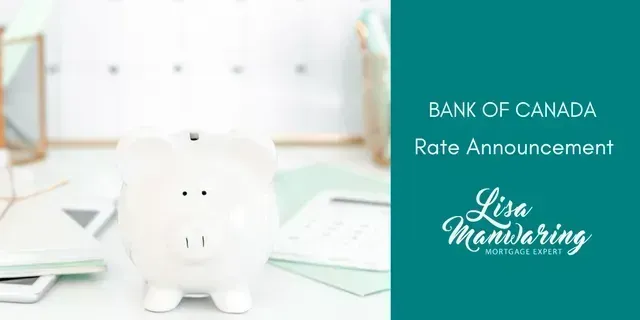What Will Mortgage Financing Look Like In 2021?
Lisa Manwaring • November 4, 2020

There is no doubt that 2020 was one for the books. It will be remembered as a year like no other. COVID-19 has caused significant national economic disruption, to say the least. While we’ve seen government intervention, record unemployment, mortgage payment deferrals, record low-interest rates, we’ve also seen continued growth in the housing market.
So what can we expect as we complete the final quarter in 2020 and move into 2021? Well, low interest rates and increased scrutiny on all mortgage applications are most likely in the cards.
Low interest rates
Right now, both fixed and variable rate mortgage rates are at all-time lows. The cost to borrow money for a mortgage has never been cheaper. According to the Bank of Canada, we can expect them to stay low for the foreseeable future. “Interest rates are very low, and they are going to be there for a long time. Canadians and Canadian businesses are facing an unusual amount of uncertainty, so we have been unusually clear about the future path for interest rates.”
And while low interest rates are a good thing for financing property now, unfortunately, they won’t be as easy to access as in previous years.
More scrutiny on mortgage applications
While we don’t expect lender or insurer guidelines to change much in the coming months, securing mortgage financing in a post-COVID economy has already proven to be harder as lenders apply increased scrutiny to each application. Every mortgage application is being looked at more deeply, and additional documentation is being requested to substantiate your application. Lenders are being more cautious about who they’re lending money to.
If you’re self-employed or rely on overtime, bonuses, or picking up additional shifts to make ends meet, securing a mortgage is going to be more difficult for you. As lenders look at a 2 year average for employment, if you took a hit to your income in 2020, that will impact you in 2021. Any type of non-guaranteed income will be more scrutinized.
If the pandemic impacted your employment and you deferred any payments (credit card, loan, line of credit, or mortgage), expect to be questioned. Lenders will ask for your story; they will want to know why you had to defer payments and how you are now in a better financial position.
Unfortunately, one of the common complaints about getting a mortgage is that it is very document-intensive. Lenders want to see a lot of supporting documents for every mortgage application. And moving into mortgage financing in 2021, you can expect even more requests for supporting documents.
Have a plan in place
So while the housing market continues to grow and low rates make it a good time to buy, the best way to prepare for increased scrutiny and documentation on your mortgage application is to plan ahead.
If your mortgage is up for renewal, you’d like to refinance, or you’re planning on buying a new property, the best thing to do is to get started immediately. Getting together your documents will take time; having a plan on what that looks like is the way to go.
I would love to have a conversation and outline all your options. If you have any questions, please don’t hesitate to contact me anytime!
RECENT POSTS

Bank of Canada maintains policy rate at 2¼%. FOR IMMEDIATE RELEASE Media Relations Ottawa, Ontario January 28, 2026 The Bank of Canada today held its target for the overnight rate at 2.25%, with the Bank Rate at 2.5% and the deposit rate at 2.20%. The outlook for the global and Canadian economies is little changed relative to the projection in the October Monetary Policy Report (MPR). However, the outlook is vulnerable to unpredictable US trade policies and geopolitical risks. Economic growth in the United States continues to outpace expectations and is projected to remain solid, driven by AI-related investment and consumer spending. Tariffs are pushing up US inflation, although their effect is expected to fade gradually later this year. In the euro area, growth has been supported by activity in service sectors and will get additional support from fiscal policy. China’s GDP growth is expected to slow gradually, as weakening domestic demand offsets strength in exports. Overall, the Bank expects global growth to average about 3% over the projection horizon. Global financial conditions have remained accommodative overall. Recent weakness in the US dollar has pushed the Canadian dollar above 72 cents, roughly where it had been since the October MPR. Oil prices have been fluctuating in response to geopolitical events and, going forward, are assumed to be slightly below the levels in the October report. US trade restrictions and uncertainty continue to disrupt growth in Canada. After a strong third quarter, GDP growth in the fourth quarter likely stalled. Exports continue to be buffeted by US tariffs, while domestic demand appears to be picking up. Employment has risen in recent months. Still, the unemployment rate remains elevated at 6.8% and relatively few businesses say they plan to hire more workers. Economic growth is projected to be modest in the near term as population growth slows and Canada adjusts to US protectionism. In the projection, consumer spending holds up and business investment strengthens gradually, with fiscal policy providing some support. The Bank projects growth of 1.1% in 2026 and 1.5% in 2027, broadly in line with the October projection. A key source of uncertainty is the upcoming review of the Canada-US-Mexico Agreement. CPI inflation picked up in December to 2.4%, boosted by base-year effects linked to last winter’s GST/HST holiday. Excluding the effect of changes in taxes, inflation has been slowing since September. The Bank’s preferred measures of core inflation have eased from 3% in October to around 2½% in December. Inflation was 2.1% in 2025 and the Bank expects inflation to stay close to the 2% target over the projection period, with trade-related cost pressures offset by excess supply. Monetary policy is focused on keeping inflation close to the 2% target while helping the economy through this period of structural adjustment. Governing Council judges the current policy rate remains appropriate, conditional on the economy evolving broadly in line with the outlook we published today. However, uncertainty is heightened and we are monitoring risks closely. If the outlook changes, we are prepared to respond. The Bank is committed to ensuring that Canadians continue to have confidence in price stability through this period of global upheaval. Information note The next scheduled date for announcing the overnight rate target is March 18, 2026. The Bank’s next MPR will be released on April 29, 2026. Read the January 28th, 2026 Monetary Report

So, you’re thinking about buying a home. You’ve got Pinterest boards full of kitchen inspo, you’re casually scrolling listings at midnight, and your friends are talking about interest rates like they’re the weather. But before you dive headfirst into house hunting— wait . Let’s talk about what “ready” really means when it comes to one of the biggest purchases of your life. Because being ready to own a home is about way more than just having a down payment (although that’s part of it). Here are the real signs you're ready—or not quite yet—to take the plunge into homeownership: 1. You're Financially Stable (and Not Just on Payday) Homeownership isn’t a one-time cost. Sure, there’s the down payment, but don’t forget about: Closing costs Property taxes Maintenance & repairs Insurance Monthly mortgage payments If your budget is stretched thin every month or you don’t have an emergency fund, pressing pause might be smart. Owning a home can be more expensive than renting in the short term—and those unexpected costs will show up. 2. You’ve Got a Steady Income and Job Security Lenders like to see consistency. That doesn’t mean you need to be at the same job forever—but a reliable, documented income (ideally for at least 2 years) goes a long way in qualifying for a mortgage. Thinking of switching jobs or going self-employed? That might affect your eligibility, so timing is everything. 3. You Know Your Credit Score—and You’ve Worked On It Your credit score tells lenders how risky (or trustworthy) you are. A higher score opens more doors (literally), while a lower score may mean higher rates—or a declined application. Pro tip: Pull your credit report before applying. Fix errors, pay down balances, and avoid taking on new debt if you’re planning to buy soon. 4. You’re Ready to Stay Put (At Least for a Bit) Buying a home isn’t just a financial decision—it’s a lifestyle one. If you’re still figuring out your long-term plans, buying might not make sense just yet. Generally, staying in your home for at least 3–5 years helps balance the upfront costs and gives your investment time to grow. If you’re more of a “see where life takes me” person right now, that’s totally fine—renting can offer the flexibility you need. 5. You’re Not Just Buying Because Everyone Else Is This one’s big. You’re not behind. You’re not failing. And buying a home just because it seems like the “adult” thing to do is a fast way to end up with buyer’s remorse. Are you buying because it fits your goals? Because you’re ready to settle, invest in your future, and take care of a space that’s all yours? If the answer is yes—you’re in the right headspace. So… Are You Ready? If you’re nodding along to most of these, amazing! You might be more ready than you think. If you’re realizing there are a few things to get in order, that’s okay too. It’s way better to prepare well than to rush into something you're not ready for. Wherever you’re at, I’d love to help you take the next step—whether that’s getting pre-approved, making a plan, or just asking questions without pressure. Let’s make sure your homebuying journey starts strong. Connect anytime—I’m here when you’re ready.


